Related Research Articles
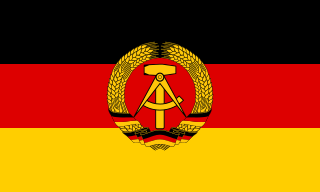
East Germany, officially the German Democratic Republic, was a country in Central Europe that existed from its creation on 7 October 1949 until its dissolution on 3 October 1990. Until 1989, it was commonly viewed as a communist state, and it described itself as a socialist "workers' and peasants' state". Before the establishment, its territory was administered and occupied by Soviet forces with the autonomy of the native communists following the Berlin Declaration abolishing German sovereignty in World War II; when the Potsdam Agreement established the Soviet-occupied zone, bounded on the east by the Oder–Neisse line. The GDR was dominated by the Socialist Unity Party of Germany (SED), a communist party from 1949 to 1989, before being democratized and liberalized under the impact of the Revolutions of 1989 against the communist states, helping East Germany be united with the West. Unlike West Germany, SED did not see its state as the successor of the German Reich (1871–1945) and abolished the goal of unification in the constitution (1974). Under the SED rule, GDR was often judged as a Soviet satellite state; most scholars and academics described it as a totalitarian regime.

German reunification was the process of re-establishing Germany as a single full sovereign state, which took place between 9 November 1989 and 15 March 1991. The day of 3 October 1990 when the "Unification Treaty" entered into force dissolving the German Democratic Republic and integrating its recently re-established constituent federated states into the Federal Republic of Germany to form present-day Germany, has been chosen as the customary German Unity Day and has thereafter been celebrated each year as a national holiday in Germany since 1991. As part of the reunification, East and West Berlin of the two countries were also de facto united into a single city; which later eventually became the capital of this country.
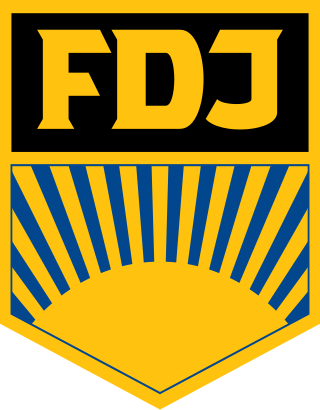
The Free German Youth is a youth movement in Germany. Formerly, it was the official youth movement of the German Democratic Republic (GDR) and the Socialist Unity Party of Germany.

Politiken is a leading Danish daily broadsheet newspaper, published by JP/Politikens Hus in Copenhagen, Denmark. It was founded in 1884 and played a role in the formation of the Danish Social Liberal Party. Since 1970 it has been independent of the party but maintains a liberal stance. It now runs an online newspaper, politiken.dk. The paper's design has won several international awards, and a number of its journalists have won the Cavling Prize.
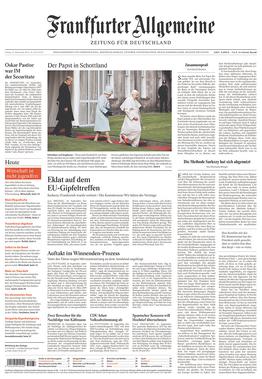
The Frankfurter Allgemeine Zeitung is a centre-right conservative-liberal and liberal-conservative German newspaper founded in 1949. It is published daily in Frankfurt. Its Sunday edition is the Frankfurter Allgemeine Sonntagszeitung.
Der Standard is an Austrian daily newspaper published in Vienna.
Junge Welt is a German daily newspaper, published in Berlin. The jW describes itself as a left-wing and Marxist newspaper. German authorities categorize it as a far-left medium hostile to the constitutional order.
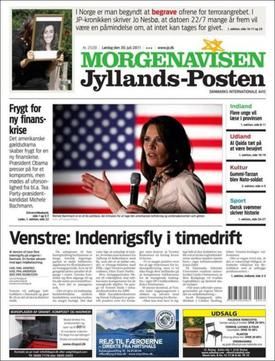
Morgenavisen Jyllands-Posten, commonly shortened to Jyllands-Posten or JP, is a Danish daily broadsheet newspaper. It is based in Aarhus C, Jutland, and with a weekday circulation of approximately 120,000 copies.

Martin Hollstein is a German sprint canoer and Olympic champion. He has been competing since the late 2000s, mostly in kayak single, double or four.
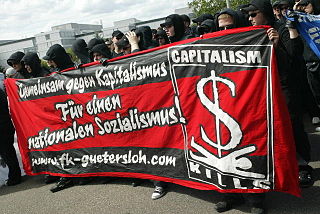
Autonome Nationalisten are German, British, Dutch and to a lesser degree Flemish Nationalists, who have adopted some of the far-left and Antifa's organizational concepts, demonstration tactics, symbolism, and elements of clothing, including Che Guevara T-shirts and keffiyehs. Similar groups have also appeared in some central and eastern European countries, beginning with Poland, the Czech Republic, Ukraine, Romania and Greece and others.
Tiroler Tageszeitung is a provincial daily newspaper published in Innsbruck, Austria. The paper has been in circulation since 1945.
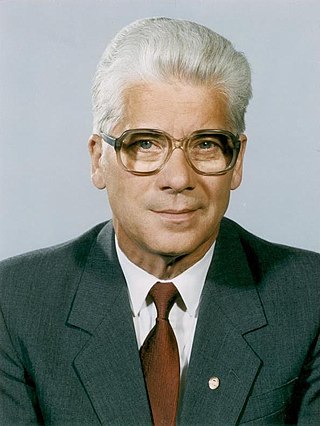
Hans Chemnitzer was a former East German national and regional politician. He was relieved of his party duties on 10 November 1989 and then expelled from the ruling Socialist Unity Party (SED) on 13 December 1989.
The Ostsee-Zeitung is a German language regional daily newspaper published in Rostock, Germany. It was launched in East Germany in 1952 and has been in circulation since then.
Lausitzer Rundschau is a daily regional newspaper published in Cottbus, Brandenburg, Germany. It has been in circulation since 1946.
Nordkurier is a German language newspaper published in Neubrandenburg, Germany. The paper is the continuation of Freie Erde which was published in the German Democratic Republic.
Marlies Deneke is a German politician.
Brigitte Zimmermann is a German journalist. Between 1983 and 1991 she was editor in chief of Wochenpost, East Germany's top selling weekly newspaper.
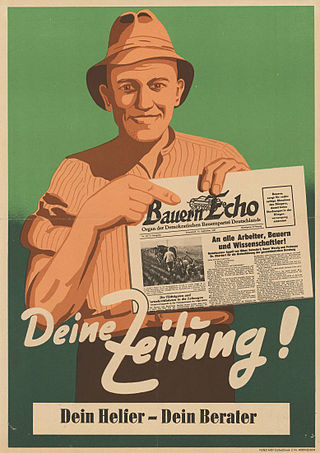
Bauern Echo was one of the newspapers which was published in East Germany. It was the official organ of the Democratic Farmers' Party of Germany and was in circulation between 1948 and 1990. Its subtitle was Organ der Demokratischen Bauernpartei Deutschlands.
Neuer Weg was the official media outlet of the East German ruling party, Socialist Unity Party (SED). Its subtitle was organ des Zentralkomitees der SED fur Fragen des Parteilebens. The magazine was in circulation between 1946 and 1989.
References
- 1 2 "Die Zeitung Freie Erde ist entziffert". Foto Community (in German). 21 May 2014. Retrieved 19 December 2014.
- 1 2 3 Andrea Czepek; Ulrike Klinger (2010). "Media Pluralism Between Market Mechanisms and Control: The German Divide". International Journal of Communication . 4: 820–843. doi:10.5167/uzh-39473.
- 1 2 "Vom Parteiorgan zur seriösen Tageszeitung". Nordkurier (in German). 1 October 2014. Retrieved 19 December 2014.
- ↑ "Bestandsverzeichnis. Zeitungen" (PDF). Haus der Geschichte der Bundesrepublik Deutschland (in German). Bonn. 2007. Archived from the original (PDF) on 16 August 2010. Retrieved 19 December 2014.
- ↑ Jörg Becker (1988). Paper technology and the third world. Eschborn: Deutsche Gesellschaft fur Technische Zusammenarbeit.
- ↑ John Brown Mason (June 1959). "Government, Administration, and Politics in East Germany: A Selected Bibliography". American Political Science Review . 53 (2): 516. doi:10.2307/1952161. JSTOR 1952161. S2CID 251095627.
- ↑ Philip Barker (4 June 2009). "Erich Honecker: My part in his downfall". SJA. Retrieved 19 December 2014.